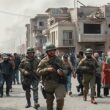A brutal knife attack shook the city of Villach in the Austrian region of Carinthia on a Saturday afternoon, leaving a 14-year-old boy dead and five others, some severely injured. The perpetrator, a 23-year-old Syrian, had apparently a clear terrorist motive: he wanted to kill or severely injure as many people as possible. Investigations revealed that the young man had radicalized via social media and an IS flag was found in his apartment.
Radicalization through TikTok
Sources from the constitutional protection agency report that the perpetrator followed Islamist preachers on TikTok, who apparently influenced him. Similarly to the planner of the Taylor Swift concert attack, Beran A, Ahmad G. radicalized through social media.
During the search of his apartment, an IS flag was found. He had also sworn allegiance to the Islamic State (IS) and was unknown in the international intelligence community, as he had no prior convictions and was not listed as a potential threat.
At the scene of the crime in the city center of Villach, the attacker randomly stabbed passersby with a folding knife, mostly hitting innocent bystanders, including the 14-year-old boy who died from his injuries. A Syrian food delivery man, who was driving by, stopped the attacker by running him over with his car and prevented further carnage. He was hailed as a hero for stopping the further rampage of the attacker. According to the investigations, Ahmad G. had apparently planned to be shot by the police.
Political Reactions and Criticism
The political reaction to the incident was swift and vehement. Interior Minister Gerhard Karner emphasized in a press conference the need to take decisive action against the perpetrator and announced “unannounced mass checks” of refugees, particularly of Syrians and Afghans who had been granted asylum in the past few years. The Kärntner Governor, Peter Kaiser, also called for more prevention to prevent such radicalizations.
FPÖ leader Herbert Kickl, however, criticized the political reactions as “empty talk” and demanded stricter measures, including a harsher migration policy and the deportation of criminal asylum seekers.
Especially, he was outraged by the reaction of President Van der Bellen, who, in his statements, seemed to downplay the murder. This sparked outrage on social media – a user commented: “It sounds like an accident. The boy was brutally murdered.”
The investigations into the perpetrator’s exact motivation and the question of how he became radicalized are ongoing. It is clear, however, that this knife attack not only shakes the city of Villach into mourning but also sparks a heated political debate about the handling of radicalization and the protection of the population.





